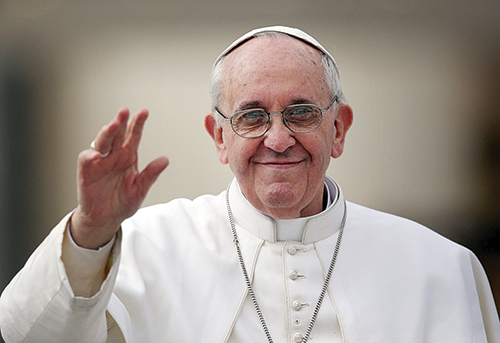There’s a quote attributed to Mahatma Gandhi that goes, “I like your Christ, I do not like your Christians. Your Christians are so unlike your Christ.” Pope Francis appears to be one of a very few religious people I’ve seen who could change Gandhi’s mind.
Who is Pope Francis?

There’s a quote attributed to Mahatma Gandhi that goes, “I like your Christ, I do not like your Christians. Your Christians are so unlike your Christ.” Pope Francis appears to be one of a very few religious people I’ve seen who could change Gandhi’s mind.
During his first Easter speech, in addition to the traditional celebration of Christ’s resurrection, Francis called for peace in the world’s troubled areas. His message, like his apparent character, was simple, sweet and sincere: Change hatred into love, vengeance into forgiveness and war into peace. He also stated his desire to “go out to every house and every family, especially where the suffering is greatest, in hospitals, in prisons.”
Again, this portrays his humble nature, which has endeared him to myself and millions of others. He appears to be a man of the people—not how I view the ostentatious hierarchy of the Catholic Church in general.
This was further evidenced on the Thursday prior to Easter, when he visited a youth detention center and washed the feet of the inmates, including the Muslim youth who were present. On Easter Sunday, he showed his grace and humility by picking up a disabled child who was lifted from the crowd and then hugging and kissing him.
During his time as archbishop in Argentina, Francis reportedly spent the Mass of the Lord’s Supper in prisons, hospitals or hospices for the poor and marginalized.
There are other, more subtle ways that Pope Francis has demonstrated how different he is from previous leaders of the Catholic Church. For instance, he forewent the traditional snazzy red pope shoes. Instead, he opted for a more understated black pair, reportedly given to him the day he left Argentina for the Vatican, by friends who insisted the pair he was wearing were unfit.
In a similar act, he demonstrated his resistance to extravagance by (for the time being) rejecting the luxury papal apartment in favor of his small suite at a hotel in the Vatican. The luxury apartment is on the top floor of the Apostolic Palace.
And this isn’t even the first time he’s refused to live in a palace. As archbishop of Argentina, he declined to reside in the archbishop’s palace and chose instead to live in a simple apartment. He refused his limousine and chauffeur, choosing to ride the bus with ordinary people. He even cooks his own meals.
As its leader, Francis enhances the Catholic Church’s image not only through his treatment of the needy, sick, poor and marginalized, but by his treatment of women, homosexuals and sex offenders. Discussing women, Francis said, “The first witnesses of the resurrection are women…This is beautiful and this is the mission of…mothers and women, to give witness to their children and grandchildren.”
Traditionalists might be concerned that Francis will begin a path toward ordaining women. Francis publicly rejected civil unions as Argentina’s archbishop, but pastors and activists claim that
Francis is personally in favor of gay marriage.
Marcelo Marquez, a gay rights activist in Argentina, claimed that Francis said to him, “I’m in favor of gay rights and…civil unions for homosexuals, but I believe that Argentina is not yet ready for a gay marriage law.”
Francis has been an outspoken critic of widespread sex abuse in the Catholic Church, saying the church must act decisively on the issue. What struck me most was his open admittance that the sex-abuse scandals threaten the credibility of the church; I wouldn’t have expected the leader of the Catholic Church to admit that its credibility could be
affected at all.
During his first speech as pope, Francis broke from tradition by asking the crowd to pray for him. He finished his Easter speech with a statement that showed his connection to the common modern man, calling for “peace in the whole world, still divided by greed, looking for easy gain, wounded by the selfishness which threatens human life and the family.”
In a world in which greed and selfishness leave some rich and many poor, this message will resonate with the millions who are struggling. Francis has shown that he’s not only connected to the needy and the ordinary, but that he’s ordinary, too. Francis’ message resonates with, and his demeanor endears him to, the common man.






